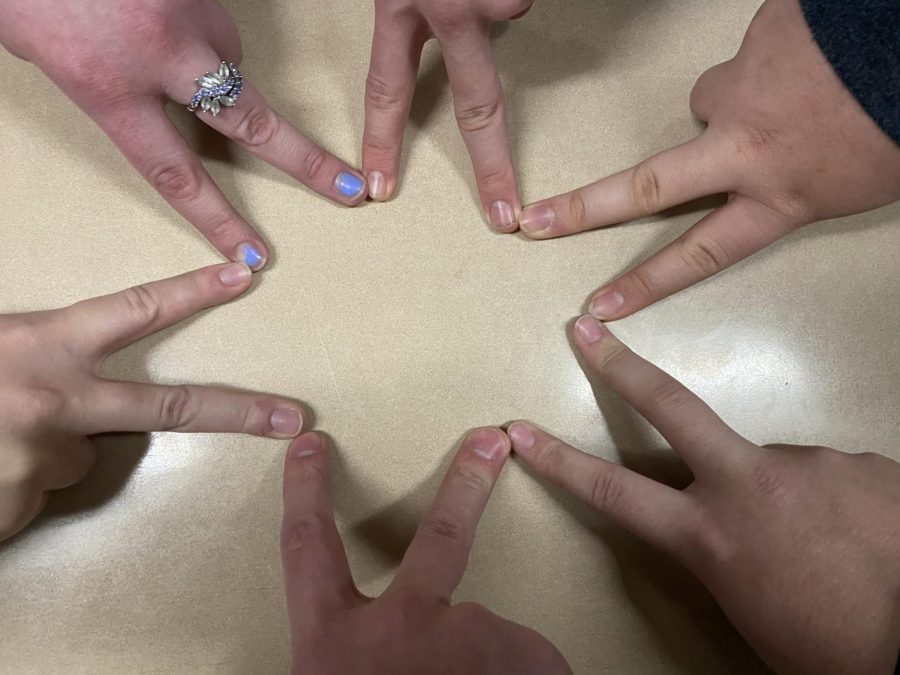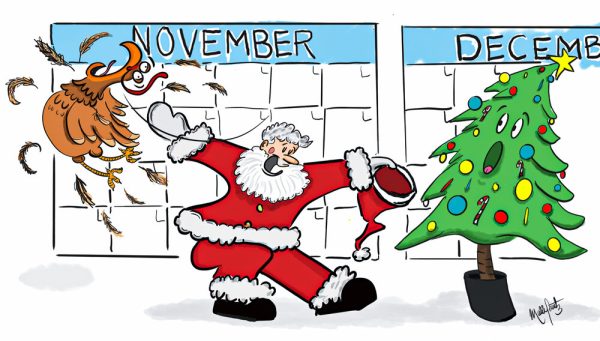We All Bleed the Same
Ross High School students come together to symbolize diversity.
Slavery was abolished in 1865. Women gained the right to vote in 1919. Immigrants were granted the right to become a U.S. citizen in 1790. So why do we still treat each other the same way we did all those years ago?
At first the changes brought pleasing results to society, but as time went on we have seemed to slowly revert back to our older ways.
A school wide survey of 33 students showed that 48.5% do not feel that there is equality in their everyday lives.
However, students are not the only ones who feel this way.
Robert P. Jones, CEO and Founder of the Public Religion Research Institute said, “Experiences with bias and discrimination are relatively common among young people age 15-24. One in four (25%) young people report having been targeted or treated unfairly themselves in the last 12 months because of their race or ethnicity, gender, sexual orientation or gender identity, immigration status, or religious beliefs.”
Inequality can be found in many aspects of life including race, religion, and gender. Although all are important, religious discrimination seems to be steadily increasing.
David Masci, former Senior Writer and Editor for the Pew Research Center stated, “Most American adults (82%) say Muslims are subject to at least some discrimination in the U.S. today, according to a Pew Research Center survey conducted in March – including a majority (56%) who say Muslims are discriminated against a lot.”
This epidemic is quickly spreading throughout our country and overseas. But the real question is why?
“The human brain naturally puts things in categories to make sense of the world. Very young children quickly learn the difference between boys and girls, for instance. But the values we place on different categories are learned – from our parents, our peers and the observations we make about how the world works. Often, discrimination stems from fear and misunderstanding,” stated The American Psychological Association.
In addition to this, the survey of 33 RHS students shows that the top two things that provoke discrimination are social media and education or lack thereof.
It’s easy to point fingers and place the blame, but the hard part comes in finding a timely solution. In the past there were laws passed, such as the Fair Housing Act, which protects people from being discriminated against when trying to buy or rent a house. Nowadays, it’s not as simple as passing a bill, it requires deeper analysis.
Some people, like junior Benjamin Spears ,believe that equality is achievable.
Spears said, “[We need to] work to get rid of the stigma that some have against others. A big place we can see this today is the institution of Affirmative Action, which favors groups whom have been discriminated against before. This very action of cherry picking discriminated groups is discriminating the rest of society. Rather than creating an environment where minority groups can live among others, it is further separating them. The American Dream is that if we work hard enough, that effort will be rewarded. But if we allow this institution to continue, we will be no better than the slave owners and klansman of the past.”
Others, like freshmen Zane Smith ,are in favor of the latter.
Smith states “We can’t. It’s impossible to live in a society in which everyone is treated the same. It is a part of human nature to judge others.”
Despite the contrasting opinions of our society, inequality is still a pressing subject.
“Some of the pain is economic: The studies suggest that the inequality depresses economic growth, leaving less for society to divvy up — regardless of how its members decide to do so. And some of it is social: Studies have found that inequality, particularly the high level seen in the present-day United States, gives rise to criminal behavior,” said Christopher Ingraham a Reporter for the Washington Post.
At the end of the day, everyone is human, and everyone has flaws. To even come close to a peace-filled world, everyone will need to listen to the words of Todd Smith, the Founder of Little Things Matter, a website that showcases articles on self improvement and encouraging people to remember to do the small things.
Smith states, “You are the only person you can change. If enough of us make a daily, conscious effort not to discriminate, it is possible for real societal change to take place.”






